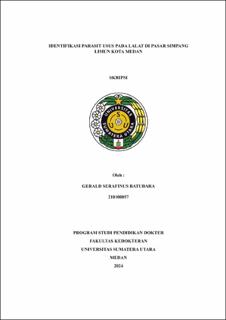| dc.description.abstract | Introduction.
Intestinal parasite infestation in human may produce clinical symptoms
such as abdominal pain, nausea and vomiting, diarrhea, and other related digestive
problems. Intestinal parasite infestation is also closely related to the lack of cognitive
development and poor growth among children . Adult flies act as mechanical vectors
because they can spread parasite through various parts of their bodies, such as
the mouth, legs, body, and wings. Traditional markets are one of the favorite
places for flies to breed b ecause they produce a lot of wet and organic waste from
sales activities. Objective . Identifying the species of flies and intestinal parasites
carried by flies at Simpang Limun Market, Medan Methods. The study sampling
collection took place in Simpang Limu n traditional market, Medan, in September
2024 . All flies were captured using plastic fly catcher and the species were
identified by morphology in the laboratory. The surface of the fly’s bodies and
their intestinal contents were centrifuged until sediment was formed. Each tube
was pooled to contain 10 adult flies. The sediment was examined under a
microscope with lugol staining. Results. A total of 414 flies were captured from
the Simpang Limun traditional market. The identified species were Musca
domestic a (70%), Chrysomya megacephala (12.5%), Fannia sp. (8.6%), Musicin
sp. (3.3%), Chrysomya bezziana (1.7%), Sarcophaga sp. (1.7%), Chrysomya
saffranea (1.2%), Phormia regina (0.7%), and Lucillia cuprina (0.2%). In total,
14 hookworm eggs were found on the su rface of the flies’ body after all samples
were processed. Conclusion. Intestinal helminth’s eggs were found on the
external surface of the fly’s bodies. The application of WASH principles can
maintain market hygiene and sanitation to limit the spread of parasites by flies. | en_US |


